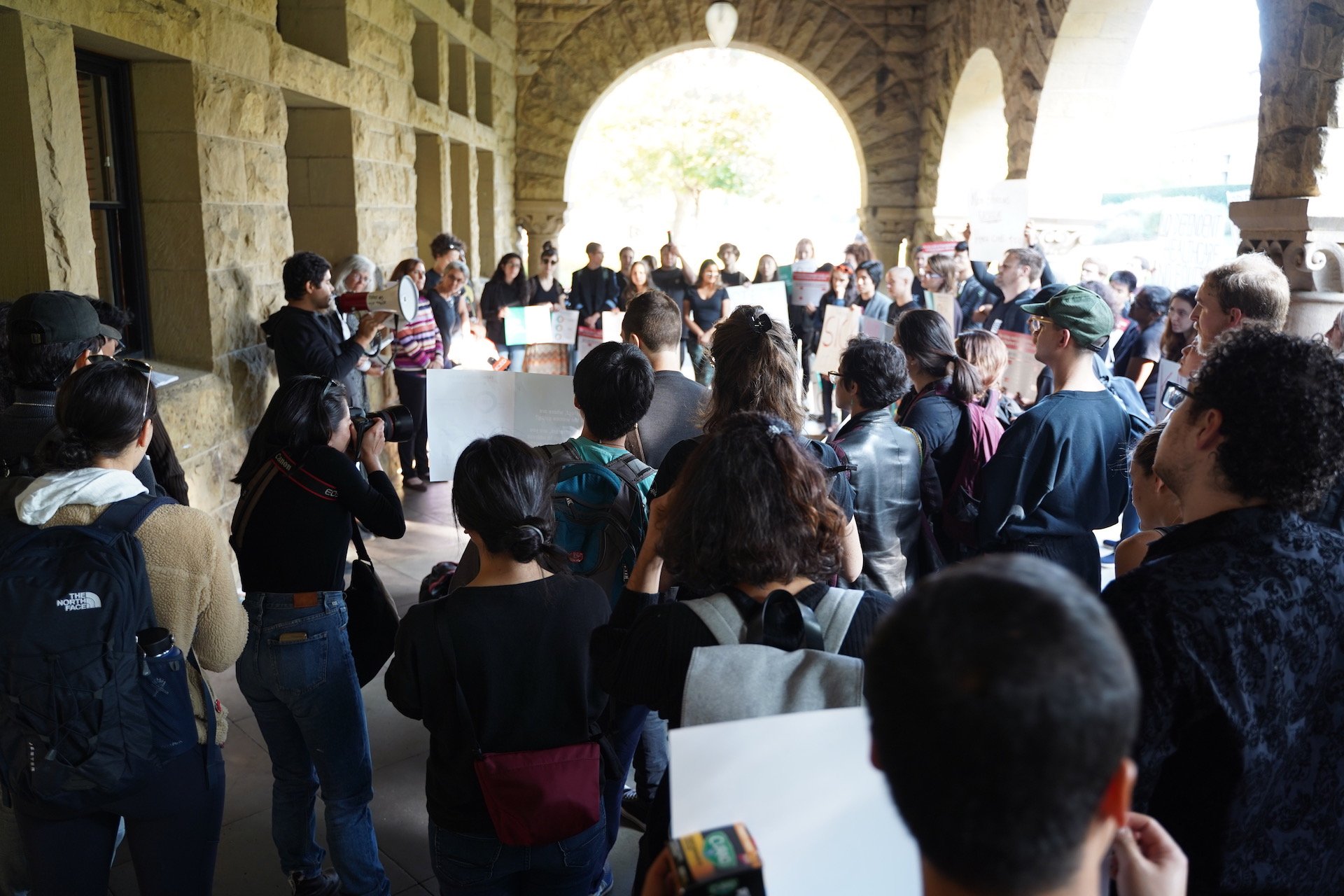Following its November protest, the Stanford Solidarity Network (SSN) launched a GoFundMe campaign to raise funds for graduate student dependent healthcare on Dec. 3, “Giving Tuesday.” The campaign, titled “Stanford Dependent Healthcare Emergency Fund,” has raised nearly $2,000 toward its $200,000 goal.
That $200,000 totals the amount all Stanford graduate students on the dependent plan pay each month in premiums to ensure the health of their dependents, according to the campaign’s description on GoFundMe. Raising the money would allow graduate students and their families to “breathe a little easier this holiday season.” The University did not confirm this total but said that it “recognizes the rising cost of dependent health insurance premiums.”
The cost of Stanford’s dependent healthcare plan has increased by around 80% since the 2013-14 school year, meaning that students with a spouse and children saw premiums increase anywhere from $496.08 to $893.69 per month. In the past year, the plan’s cost has increased by 12.2% to 15%, varying for each graduate student depending on their number of dependents, translating into an increased fee of over $100 a month.
SSN has characterized this increase as the University purposefully sending the healthcare plan into a “death spiral,” where increasing premiums cause students to leave the plan, necessitating further rate hikes.
Justine Modica, a fifth-year history Ph.D. student and SSN member, said the campaign will run until Stanford reduces the cost of the dependent healthcare plan.
Modica explained that SSN will distribute the money to all graduate students on the plan if the GoFundMe raises the $200,000. However, if the campaign does not meet its funding goal, SSN will distribute funds to graduate students with the most demonstrated need.
Community pitches in
Geoff Ivison, a fifth-year immunology graduate student, told The Daily that he donated $20 to demonstrate that “that there is strong support in our community for graduate students with dependent children, both to those families and to the administration.”
Fifth-year history Ph.D. student and GoFundMe donor Elizabeth Jacob M.A. ’17 said she has had difficulties with Cardinal Care’s coverage and has needed to use Stanford’s emergency medical funds to afford expenses like her wisdom teeth removal.
“I truly cannot imagine what it would be like to do my academic work with the added anxiety of not being able to fully insure my dependents,” Jacob said. “What is the use in having access to world-class healthcare at Stanford Medical Center if none of us can afford it?”
Makenna Morck, a sixth-year biochemistry Ph.D. student, said she donated $50 because she “would never want to choose between feeding my children or providing them with healthcare.”
The current annual options to apply for supplemental healthcare grant funding are an inadequate solution, she added. Stanford offers a $10,000 Graduate Family Grant for graduate students with dependents.
“The current stopgaps don’t take into account that this is a recurring cost,” Morck said. “Students should not be held responsible to continually apply for these [grants] while the underlying cause is not being addressed.”
Stanford’s post-protest response
In November, graduate students and their dependents protested the rising cost of Stanford’s dependent healthcare plan in a rally organized by SSN. The rally took place after SSN collected 1,000 signatures on an online petition calling for Stanford to make graduate and dependent healthcare free for all those unable to get healthcare through their employers.
In an email to The Daily following the protest, Vice Provost for Student Affairs Susie Brubaker-Cole and Vice Provost for Graduate Education Stacey Bent wrote that “dependent insurance costs remain high, reflecting the high cost of medical care in our region,” and the two are continuing to look for a solution. Brubaker-Cole and Bent commended the Affordability Task Force, a component of Stanford’s Long-Range Planning process, for its continued work on creating a set of prioritized recommendations regarding affordability for the Executive Cabinet.
SSN media representative and graduate student Katherine Whatley characterized the Stanford administration’s response to the protest as inadequate.
“The University took a month to meet with us, and [at the meeting], they focused primarily on the Affordability Task Force as a way to resolve this issue, and encouraged us to wait for the recommendations made by the task force,” Whatley said. “While we appreciate their willingness to meet with us, we were disappointed that they took so long and that they seem unwilling to look beyond the monetary cost to resolve this issue immediately.”
Student Affairs spokesperson Pat Harris, writing on behalf of the VPSA and VPGE, told The Daily that Stanford will continue working with graduate students to address affordability concerns.
Modica concluded that SSN will continue its own efforts to make dependent healthcare free.
“We want to collaborate. We are hoping that’s what our next steps will be. But that will depend on them,” Modica said. “We’re mobilized to continue until we see change.”
